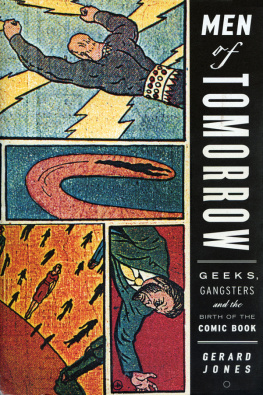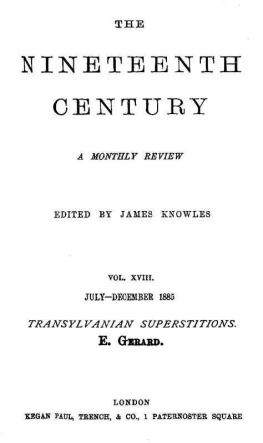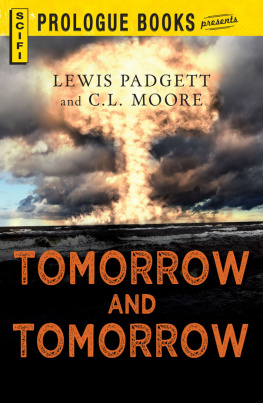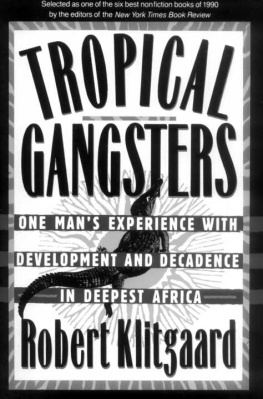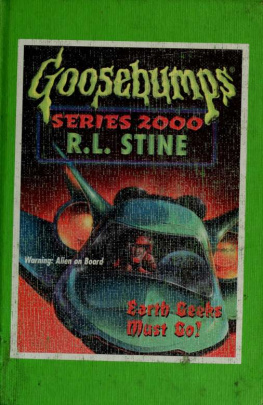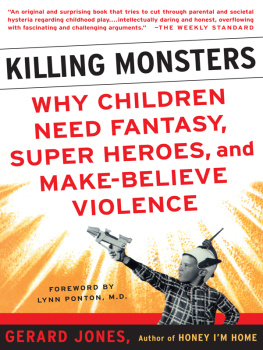Gerard Jones - Men of Tomorrow: Geeks, Gangsters, and the Birth of the Comic Book
Here you can read online Gerard Jones - Men of Tomorrow: Geeks, Gangsters, and the Birth of the Comic Book full text of the book (entire story) in english for free. Download pdf and epub, get meaning, cover and reviews about this ebook. year: 2004, publisher: Basic Books, genre: Non-fiction. Description of the work, (preface) as well as reviews are available. Best literature library LitArk.com created for fans of good reading and offers a wide selection of genres:
Romance novel
Science fiction
Adventure
Detective
Science
History
Home and family
Prose
Art
Politics
Computer
Non-fiction
Religion
Business
Children
Humor
Choose a favorite category and find really read worthwhile books. Enjoy immersion in the world of imagination, feel the emotions of the characters or learn something new for yourself, make an fascinating discovery.
- Book:Men of Tomorrow: Geeks, Gangsters, and the Birth of the Comic Book
- Author:
- Publisher:Basic Books
- Genre:
- Year:2004
- Rating:4 / 5
- Favourites:Add to favourites
- Your mark:
- 80
- 1
- 2
- 3
- 4
- 5
Men of Tomorrow: Geeks, Gangsters, and the Birth of the Comic Book: summary, description and annotation
We offer to read an annotation, description, summary or preface (depends on what the author of the book "Men of Tomorrow: Geeks, Gangsters, and the Birth of the Comic Book" wrote himself). If you haven't found the necessary information about the book — write in the comments, we will try to find it.
Gerard Jones: author's other books
Who wrote Men of Tomorrow: Geeks, Gangsters, and the Birth of the Comic Book? Find out the surname, the name of the author of the book and a list of all author's works by series.
Men of Tomorrow: Geeks, Gangsters, and the Birth of the Comic Book — read online for free the complete book (whole text) full work
Below is the text of the book, divided by pages. System saving the place of the last page read, allows you to conveniently read the book "Men of Tomorrow: Geeks, Gangsters, and the Birth of the Comic Book" online for free, without having to search again every time where you left off. Put a bookmark, and you can go to the page where you finished reading at any time.
Font size:
Interval:
Bookmark:
Geeks, Gangsters, and the Birth of the Comic Book
Gerard Jones
One of the challenges of this book has been to dig through the tall tales, drunken misunderstandings, and self-protective fudgings that have shaped the accepted history of this oddest of American art forms and arrive at some kind of truth. My interviews and conversations with many of the survivors of the industrys early days and their families proved to be the most important tool in that digging. It was over scrod and beer at the Westport Marina with Irwin Donenfeld that the stories of Harry Donenfeld and Jack Liebowitz first came clear to me, and over doughnuts and coffee in the Property Development offices in Beachwood with Irv and Jerry Fine that I first saw the shape of the Jerry Siegel story as Ive told it here. Many other members of the Donenfeld, Siegel, and Liebowitz clans helped me, as well, as did some friends and former business associates of the men Ive written about. Some have asked to remain anonymous, either for the sake of decorum or out of respect for the ongoing litigation involving the ownership of Superman, but one I can and must thank is Harrys loyal friend, Jack Adams.
My twenty years of involvement with the comic book industry have blessed me with the opportunity to meet many of the men who created the form. On two occasions in the 1980s, I was fortunate enough to chat with Jerry Siegel and Joe Shuster at the San Diego Comic Con; insights they gave me then have turned out to be important, and previously unpublished, pieces of the book I would write nearly two decades later. During those same years I interviewed or spoke at length with Jack Schiff, Julius Schwartz, Vin Sullivan, Murray Boltinoff, Jack Kirby, and other pioneers who are no longer with us. I also owe a huge debt to the men who so graciously submitted to my interviews and sometimes disconcerting questions for this project in particular: the late Will Eisner, Stan Lee, Jack Williamson, Alvin Schwartz, and the very generous Jerry Robinson.
Ive depended not only on the people who lived the history of comics but on those whove studied it as connoisseurs and collectors and who were able to lead me through the forest of contradictions and deceptions to the most plausible path of real events. My Virgil, my Tenzing, my Sacagawea was Michael Feldman, who has spent many years tracking bits of the big picture and speaks wisely and knowledgeably of the place of comics in the larger context of alternative cultures and Jewish enterprise in a largely buried American past. Others without whom the book would not have been complete include Will Murray, Denis Kitchen, Tom Andrae, Mike Catron, Michael Uslan, Mark Evanier, Anthony Tollin, Richard Halegua, Bob Beerbohm, Mark Waid, and Paul Levitz. My research in Cleveland was made delightful and productive by the hospitality of Mike Sangiacomo of the Plain Dealer and Carolyn Johnson of Glenville High School. For vital moments of encouragement and correction Im grateful to Art Spiegelman, Jules Feiffer, Paul Buhle, and Michael Chabon. Im also very grateful to those who caught errors in the first edition of this book and so enabled me to correct this one, including Roy Thomas, Larry Miller, Alan Light, and, especially, Michael Siegel and Douglas Nicholson, sons, respectively, of Jerry Siegel and Malcolm Wheeler-Nicholson.
If this books substance was the gift of those thanked above, then its form was given by the friends who listened to me fret and patted my head and read the chapters as I felt bold enough to expose them: Allen Weinberg, Charlie Goldberg, Henry Jenkins, Heidi Anderson, Joe Filice, Joel Millner, Andrea Rundgren, Helene Manheim, and Erika Silver, whose inexplicable gift of an ancient copy of Jerry Siegels G. I. Joe unlocked the door to so much. Then there were the two who read every damned page of the unrevised draft and too many rewrites: Melissa McAvoy, who can catch a lazy adverb even while drowning in a vortex of swirling dogs and children; and Carla Seal-Wanner, who turned her profound indifference to superheroes into a critical weapon to force me repeatedly into reluctant clarity.
My gratitude, finally, to Jennie, who became a single parent for months to enable me to finish the manuscript; to Nicky, who endured so little daddy time with such generosity; to my eternally encouraging agent, Carol Mann; and to everyone with Perseus Books who worked so hard on the countless little details, especially Ellen Garrison, Rich Lane, that prince of copyeditors Steven Baker, and most of all, Jo Ann Miller, the editor whose Solomonic wisdom, Herculean efforts, Atlas-like steadiness, Zeusian authority, Achillean passion, and Mercurial swiftness snatched me from the clutches of chaos and despair at the last possible second. Suh-HAZ-am!
Gerard Jones
June 2005
Secret Identity
J erry pushed the paper across the table. Read that, he said. He watched her as she read the details. The Mario Puzo script. The plans to to cast Paul Newman or Clint Eastwood or Dustin Hoffman in the title role. The images of the herohis herolaser-beamed onto giant balloons in Battery Park that created mucho pre-pic talk. When her eyes flashed with rage he knew shed hit the part about the 3 million dollars. A fortune dished out by Warner Brothers for the rights to make a Superman movie, and not a penny to Jerry or Joe or their families.
You cant let them get away with this, said Joanne. What more can I do? he asked. Twice Jerry had fought them in court, twice he had ruined his career and left himself scrambling as theyd gotten richer. Write to Variety yourself, she said. Tell them the real story. But he was afraid. Theyd told him they might do something for him financially if hed drop his plans to appeal to the Supreme Court. Anything he did now would kill that hope. Theyre never going to do anything for you, snapped Joanne. Not unless you shame them into it. Not unless you tell the world what Jack Liebowitz did to you.
I couldnt stand that, said Jerry, and he left for work. All his life hed hidden his pain and lossthe first loss that had shattered his childhood and this other loss he kept reliving, these thirty years of feeling his one great creation torn from him. Hed always tried to seem stronger than his pain. But on the long ride to work, the words began to form. Since his heart attack hed been riding the bus more than driving, and there are few journeys more dismal or interminable than a bus ride through the Los Angeles Basin in the summer. From Westwood along the underside of Beverly Hills, through the tattered remnants of the Miracle Mile and into the cratered ruins of downtown, he and the retired people on fixed incomes and the Mexicans going to clean houses crawled hardly faster than a young man could walk. He had time to think of what he could tell the world about Jack Liebowitz. The double-dealer, the backstabber, the crook.
At last the bus brought him to the state office building where he worked. There he had more time to think, eight hours as a mail clerk, sorting and delivering and thinking about Jack Liebowitz pocketing his piece of that $3 million. Some of the secretaries in the building had heard who Jerry was, and he could see the skepticism in their eyes as he brought the mail into their offices, see them trying to match this timid little man with the hero of TV shows and movies. You didnt really create Superman, did you? theyd ask. Hed force a grin and say, Oh, yes I did! And hed remember thirty years before, when his name was in three hundred newspapers every day, when he was on Fred Allens radio show coast to coast, being listened to by secretaries and elderly mail clerks who wondered what it would be like to create something that everyone in the world knew.
Font size:
Interval:
Bookmark:
Similar books «Men of Tomorrow: Geeks, Gangsters, and the Birth of the Comic Book»
Look at similar books to Men of Tomorrow: Geeks, Gangsters, and the Birth of the Comic Book. We have selected literature similar in name and meaning in the hope of providing readers with more options to find new, interesting, not yet read works.
Discussion, reviews of the book Men of Tomorrow: Geeks, Gangsters, and the Birth of the Comic Book and just readers' own opinions. Leave your comments, write what you think about the work, its meaning or the main characters. Specify what exactly you liked and what you didn't like, and why you think so.

